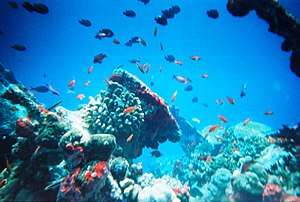Productivity (ecology)
In ecology, the term productivity refers to the rate of generation of biomass in an ecosystem, usually expressed in units of mass per volume (unit surface) per unit of time, such as grams per square metre per day (g m−2 d−1). The unit of mass can relate to dry matter or to the mass of generated carbon. The productivity of autotrophs, such as plants, is called primary productivity, while the productivity of heterotrophs, such as animals, is called secondary productivity.[1]
Primary production
Primary production is the synthesis of new organic material from inorganic molecules such as H
2O and CO
2. It is dominated by the process of photosynthesis which uses sunlight to synthesise organic molecules such as sugar.
Secondary production
Secondary production is the generation of biomass of heterotrophic (consumer) organisms in a system. This is driven by the transfer of organic material between trophic levels, and represents the quantity of new tissue created through the use of assimilated food. Secondary production is sometimes defined to only include consumption of primary producers by herbivorous consumers[2] (with tertiary production referring to carnivorous consumers),[3] but is more commonly defined to include all biomass generation by heterotrophs.[1]
Organisms responsible for secondary production include animals, protists, fungi and many bacteria.
Secondary production can be estimated through a number of different methods including increment summation, removal summation, the instantaneous growth method and the Allen curve method.[4] The choice between these methods will depend on the assumptions of each and the ecosystem under study. For instance, whether cohorts should be distinguished, whether linear mortality can be assumed and whether population growth is exponential.
See also
- Biomass (ecology)
- Community ecology
- Food web
- Agricultural productivity
References
- Allaby, Michael, ed. (2006) [1994]. A Dictionary of Ecology (Third ed.). Oxford, UK: Oxford University Press. ISBN 978-0-19-860905-6. Retrieved 2009-12-03.
- "Definition of term: "Secondary production"". The Glossary Table. FishBase. Retrieved 2009-12-03.
- "Definition of term: "Tertiary production"". The Glossary Table. FishBase. Retrieved 2009-12-03.
- Allen, K.R. (1951). "The Horokiwi Stream: A study of a trout population". New Zealand Marine Department Fisheries Bulletin. 10: 1–238.

